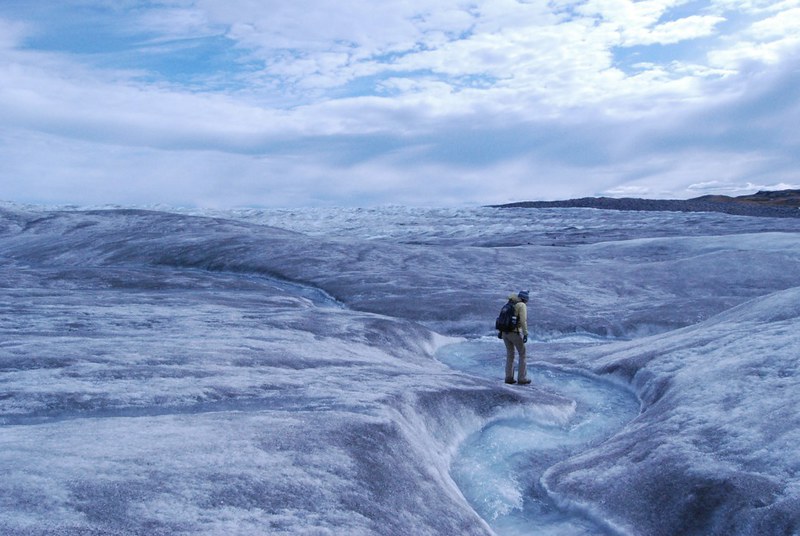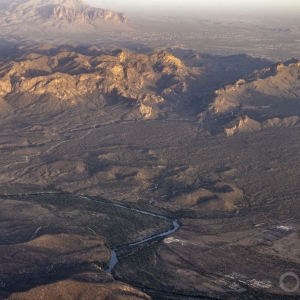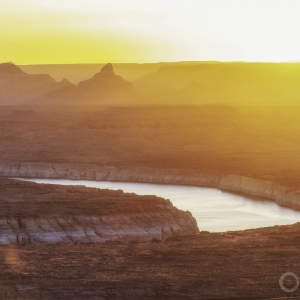The Stream, July 27, 2022: Greenland Heatwave Spurs Massive Ice Melting Event

Persistent melt in 2008 lifted the snow cover from a low-lying area of Greenland’s ice sheet, revealing a rough terrain crossed by melt water streams. Photo © Thomas Neumann / NASA GSFC
YOUR GLOBAL RUNDOWN
- High temperatures in Greenland melt millions of tons of ice in just three days.
- Flash floods in Iran kill nearly two dozen.
- U.K. officials urge residents to cut water use voluntarily as a drought declaration looms.
In many U.S. cities, local officials ask residents to pay for lead pipe replacement on private property.
“Not only is it not solving the problem, in some cases, it’s making it actively worse.”
– Devra Levy, an organizer with Rhode Island’s Childhood Lead Action Project
A recent investigation from the Guardian found that without federal funding, many cities are asking residents to foot the bill for lead pipe replacements. Low-income homeowners and renters are often left out of this equation, leaving them with contaminated water. If a resident is unable to pay for lead pipe removal on private property, some cities will only replace a pipe up to the property line. Disrupting and cutting old pipes runs the risk of more lead breaking off and flowing into a resident’s water. According to the Environmental Defense Fund, a majority of U.S. water utilities operate this way.
- In Context: In 2020, Chicago’s mayor Lori Lightfoot announced an $8.5 billion program to replace all lead pipes in the city. One feature of the initiative, the equity program, offers to fully subsidize the replacement for Chicagoans below a certain income level. Just as with public resistance to Covid-19 vaccines, the response to Chicago’s lead pipe replacement project is a story playing out in neighborhoods across the country. Government public interest initiatives, even with the best of intentions and resources, are being curtailed by mistrust.
— Jane Johnston, Stream Editor
Recent WaterNews from Circle of Blue
Concrete River: Water, Life Pollution, And The Future Of The Los Angeles River – In its recent history, the Los Angeles River has been abused by its urban setting, channelized and tainted with industrial runoff. But along its northern reaches, a restoration is taking shape.
Drought in the American West, July 26, 2022: Colorado River’s Upper Basin States Pledge to Cut Water Use – As of July 19, over 44 percent of the U.S. and Puerto Rico is in drought, a nearly 12 percent increase in the last month.
What’s Up With Water—July 26, 2022 – This week’s episode of What’s Up With Water covers the state of Australia’s environment and a record-breaking heat wave across Europe. Plus, Circle of Blue reports on the enduring allure of big water supply pipelines in the drying American West.
Drought in the American West
- As of July 19, over 44 percent of the U.S. and Puerto Rico is in drought, a nearly 12 percent increase in the last month.
- States in the Colorado River’s upper basin respond to the federal government’s call for water conservation.
- The Albuquerque stretch of the Rio Grande is drying up for the first time in almost 40 years.
- High temperatures and dry conditions are fanning the Oak fire in Mariposa County, California, which has burned more than 16,700 acres.
For the latest need-to-know news out of the drying American West, read Circle of Blue’s weekly roundup.
This Week’s Top Water Stories, Told In Numbers
18 BILLION
In Greenland, high temperatures melted 18 billion tons of ice in just three days. Scientists say the “unusually extensive melt event” is just the latest of a string of melting events contributing to rising sea levels worldwide. Ice sheets in Greenland and Antarctica hold nearly around 70 percent of the earth’s freshwater. The Greenland ice sheet is melting at an alarming rate. If the entire sheet melts, global sea levels could rise by 20 feet (six meters).
22 PEOPLE
Flash floods in Iran have killed at least 22 people. One person was missing as of last weekend, Al Jazeera reports. Heavy rains flooded central parts of the town of Estahban on Friday. Although large swaths of Iran have endured repeated drought over the past decade, flooding has become quite common when heavy rains fall on the cracked, dry earth.
On the Radar
Officials in the United Kingdom have urged residents to curb their water use amid extreme weather. The Environment Agency’s National Drought Group (NDG), a collective of farmers, environment experts and government representatives, met this week to discuss a response to a recent heatwave that enveloped the UK and surrounding European countries. The NDG stopped short of issuing mandatory water cuts, but said a drought declaration could come next month if dry conditions and high temperatures continue. The declaration would likely force farmers to stop irrigating fields and ban hosepipes for residents across the country.
- UK Heatwave: After several days, villages across Kent and East Sussex counties have flowing water Residents in these South East England towns first recorded interruptions to their water supply on July 16. Water utility officials in the area said that the water cuts could be blamed on a burst pipe, as well as high demand due to the heatwave.
More Water News
Water in Australia—Too Much and Too Little: In Sydney, experts say development has put more and more residents at risk of flooding. Meanwhile, Australians in more than 400 remote or regional communities lack access to clean drinking water, new research has found.
Freshwater Mangroves: Researchers have discovered mangroves growing in freshwater forested wetlands. Before now, mangroves have only been found to grow in saltwater habitats.
Jane is a Communications Associate for Circle of Blue. She writes The Stream and has covered domestic and international water issues for Circle of Blue. She is a recent graduate of Grand Valley State University, where she studied Multimedia Journalism and Women, Gender and Sexuality Studies. During her time at Grand Valley, she was the host of the Community Service Learning Center podcast Be the Change. Currently based in Grand Rapids, Michigan, Jane enjoys listening to music, reading and spending time outdoors.





 © J. Carl Ganter / Circle of Blue
© J. Carl Ganter / Circle of Blue
Leave a Reply
Want to join the discussion?Feel free to contribute!